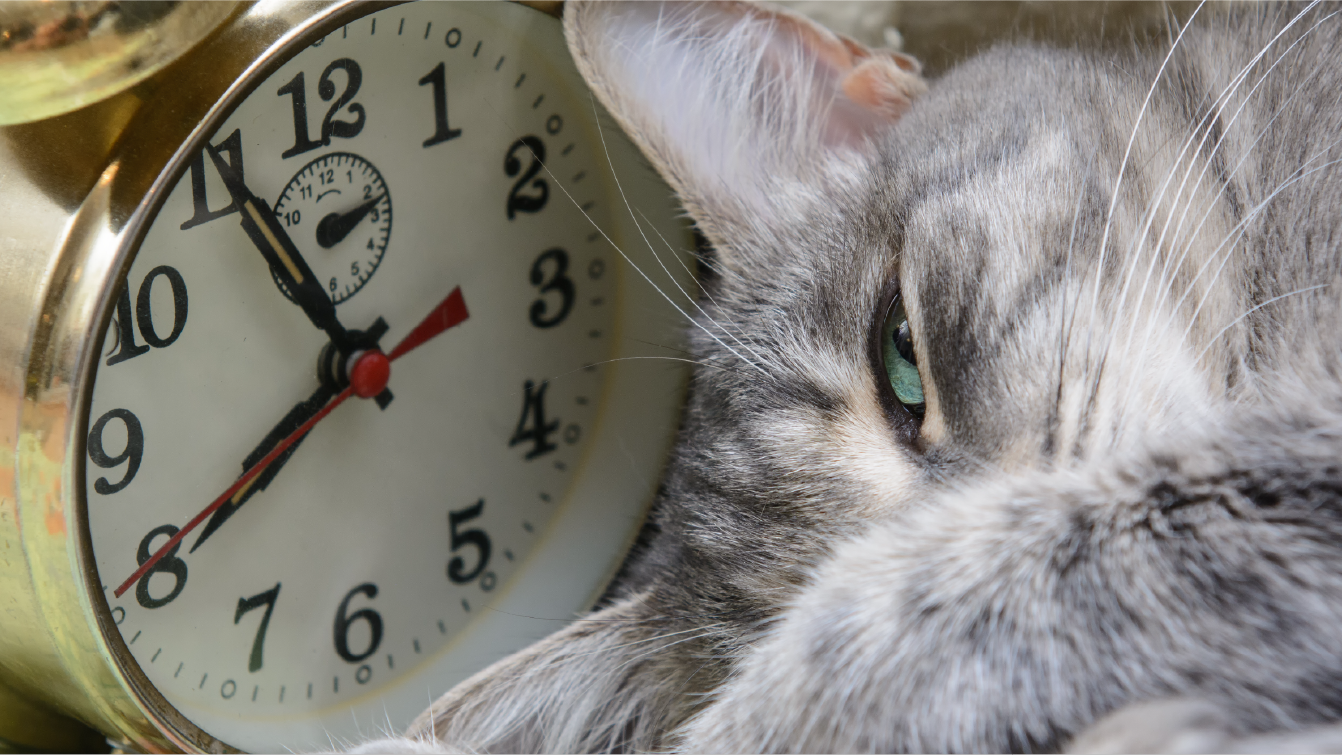25th October 2024
Prepare your cat for the clocks changing
‘Daylight Saving Time’ impacts all of us in the UK. As clocks ‘spring forward’ and ‘fall back’, it signals the beginning and the end of our summer season. The purpose of Daylight Saving Time is to help us enjoy as many daylight hours as we can while it’s here.
Our clocks move forward by one hour at 1am on the last Sunday of March and go back by one hour at 2am on the last Sunday of October.
If we consider the differences a clock change has on our own routines, it isn’t surprising that our cats are affected by the clocks changing, too.
So, read on to discover several ways you can support your cat as the clocks change…
How does Daylight Saving Time impact our cats?
Both cats and dogs seem to have an incredible ability to tell the time – which, for most of our pets, can make them creatures of habit.
As creatures of habit, many cats find comfort in following a routine that helps them know what to expect to happen and when. Here are some of the ways a clock change might impact your cat:
Mealtimes
Lots of cats become accustomed to being fed at specific times, which means they’re likely to feel hungry at the same times every day. That means your cat could become restless, anxious, or even feel stressed when they aren’t given food at the time they’re usually fed.
Toilet times
For many of our feline friends, being able to toilet at set times becomes part of their daily routine. As an example, if a cat isn’t let outside to toilet as expected, they might end up disturbing their pet parent earlier than usual with an unwelcome wake-up call!
Bedtime
Every change to your cat’s routine could have a knock-on effect on other aspects of their day. Therefore, when clocks change, your cat may become active earlier in the morning or stay wide awake when it’s time to settle for bedtime.

How to help your cat prepare for the clocks changing
Sudden changes to their routine can be stressful for our feline friends. So, we should start working towards a stress-free transition for our pets before the clocks change – and here’s how:
Remember: It’s important that you contact a vet for advice if your cat struggles with the clocks changing.
Mealtimes
Should you feed your cat at specific times each day, shifting their feeding times in 15-minute blocks in the week leading up to the clocks changing may be beneficial.
As the clocks are springing forward, you could feed your cat 15 minutes earlier each day, to offer a gradual adjustment in preparation for that.
When the clocks are about to fall back, it might be helpful to shift your pet’s feeding time every day during the week before, so it’s 15 minutes later each time.
Alternatively, you could train your cat to let you know when they’re hungry around the same hour every day – between 6pm and 7pm, for example. That way, an hour’s difference in their feeding routine won’t become an issue.
Toilet times
Your cat might be used to going straight outside to relieve themselves as soon as they wake up in the morning or immediately after every meal.
Depending on your pet’s personality, you may be able to adjust their toileting times to align with their gradually changing mealtimes (e.g. 15 minutes earlier or later each day).
If the gentle shift in their feeding routine doesn’t affect your cat’s toileting habits, stick to their normal toileting routine until their body naturally adjusts to their new feeding schedule.
Top tip: To avoid disrupting your cat’s toilet routine, you may want to allow them to go out before food when the clocks change, instead of afterwards.
Bedtime
To lessen the chances of having your sleep interrupted, minor adjustments to your cat’s evening routine can work wonders.
For example, should your feline friend struggle to settle during the lighter nights, playing with them a little longer before it’s time to sleep might help them feel calmer.
As an alternative, you could feed your cat a little later in the evening as it gets lighter, which could help them sleep more easily. Then, the following morning, you may find that your cat will ask for their breakfast a little later, too.
Medication
If you’re concerned that the clocks changing may cause problems with your pet’s medication timings, please speak to your vet, since they’ll know and understand your case best.
For access to video consultations with RCVS-registered vets and vet nurses at any time, from anywhere, you can speak to the experts over at Joii Pet Care for advice.
Looking for more cat advice?
We’ve written some handy cat advice guides, to help you unlock the secrets of your mysterious moggy.
Need cat insurance?
Cat insurance can help cover the cost of veterinary treatment if your cat gets injured or falls ill.
